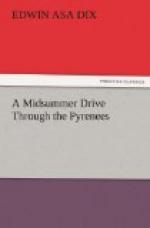The other half of the town I have called international. This is the section of the hotels, of wide streets and flagged walks, of massy squares of business buildings, of villas and a park and the bathing circle. The sea swings around the projecting cape of the citadel into a deeply notched bay, small and still, and on its edge which meets the town you find pavilions and beach-chairs and their usual accompaniment of idling humanity. The Casino stands boldly up, a little to the right, and in front of it, on the Alameda, the band will play in the coming summer evenings for all the elite of Madrid.
The fine Hotel de Londres is large and well kept, and, like all Spanish hotels, charges on the good American plan of so much per day. One gratefully appreciates this, after juggling every few days with disheartening lists of accumulated coffees and eggs and dinners and rooms and mineral waters and service and bougies, and the others. The infinitude of microscopic book-keeping made necessary by the Continental system is a thought to shudder at. For the rest, the hotel is only unsatisfying because it seems in nowise distinctively Spanish. We almost wish we had chosen a certain other hostelry equally well spoken of, which, instead of Hotel, had alluringly styled itself a Fonda. Probably we might have found as little there as here that was pure Castilian. Save in language and location, San Sebastian is not of Spain, Spanish. And as with Biarritz, it is not to be sought for its reminiscences of old age. It is trim and “kempt” and modern, and lives strictly in the present. We soon come to realize this, cease longing for the unattainable, and enjoy the place for what it is. Perhaps we shall recoup the vanished patina to-morrow, when we visit an older and far different town,—Fuenterrabia.
III.
The Sebastian season is coextensive with the summer season at Biarritz; perhaps rather tardier in its beginnings. Consequently we are still somewhat in advance of the tide. This is distinctly a disadvantage, as it was in part at Biarritz. There are places whose very reason for existence is society. Only in this costume are they rightly themselves; only in full dress, so to say, should they be called upon. In a true “sentimental journey,” art and nature and history should take but equal turn with the life of the present. The ideal traveler courts solitude in a ruin and society in a resort. The spirit of each is differently divined.
And San Sebastian out of season is a casket without its jewels,—modern-made casket at that, costly but uncharacteristic, and with nothing of an heirloom’s charm; a casket neither encased in time’s antique leather nor encrusted with true Spanish enamel.




